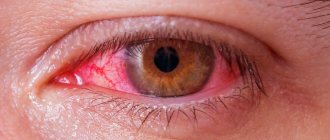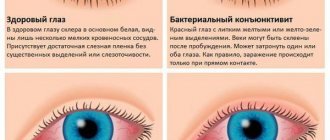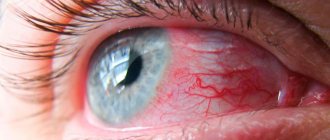Causes
The herpes type of disease occurs due to infection with a virus. It is present in the body of almost every person. Activated against the background of decreased immunity. The following factors also contribute to this:
- failure to comply with personal hygiene rules;
- mucosal injuries;
- burns;
- damage by a foreign object;
- decreased immunity.
The infection enters the mucous membrane through airborne droplets. You can also become infected through contact. If herpes appears on the lips, then a person can independently transfer the infection to the eyes. Therefore, you should not touch them with dirty hands.
Risk group
This type of disease is common and tends to affect every person. This is due to the individuality of the body and immunity. Patients with the following factors may be at risk:
- chronic diseases;
- colds, flu;
- the presence of herpes on the lips and other parts of the body;
- children and old age;
- autoimmune, systemic diseases;
- violation of metabolic processes;
- Unhealthy Lifestyle.
Infection mainly occurs against the background of violation of sanitary rules.
Causes of the disease
The cause of herpetic conjunctivitis is the activation of HSV 1, which affects the skin and mucous membrane of the eye. The widespread prevalence of this microorganism suggests that 80-90% of the world's population is infected. The pathogen is resistant to many environmental factors. The ways of infection with herpes are varied:
- airborne;
- contact;
- dusty
Once the virus enters the human body, it remains there forever. During periods favorable for reproduction, it is activated, causing herpetic conjunctivitis.
Classification
This type of disease in ophthalmology is divided into the following forms:
- follicular - accompanied by severe symptoms: high fever, chills, friability of the conjunctiva, the presence of a rash in the form of small round blisters, mucous discharge, film formation in front of the eyes, redness, decreased visual acuity, cough and runny nose, severe weakness and malaise; characterized by slow development, requires immediate treatment;
- vesicular-ulcerative - accompanied by abundant purulent discharge, the appearance of ulcers and erosions on the edges of the eyelids, conjunctiva and sclera; after recovery, characteristic scars remain at the sites of the rash; often with this form of the disease, blepharospasm, uncontrolled lacrimation, sensitivity to light, decreased visual acuity appear;
- catarrhal - occurs rapidly and tends to pass quickly, rarely becomes chronic, accompanied by swelling, redness, and thick mucous discharge.
Only a doctor can determine the type of disease after a comprehensive examination.
When should you contact an ophthalmologist?
- When complaints increase and there is no positive dynamics for several days.
- Pain in the eye.
- Deterioration of vision.
- Copious purulent and mucous discharge from the eyes.
If, in addition to eye inflammation, there are accompanying symptoms of infection (fever, difficulty breathing, shortness of breath, cough), or you have had contact with someone who has COVID-19 in the last 2 weeks, you should be wary of a possible coronavirus infection.
In conclusion, I would like to note the importance of frequent and proper hand washing. Avoid touching your eyes and face with your hands.
Gasanova Zamira Elmanovna , ophthalmologist
Symptoms
The incubation period of the disease lasts from 3 to 14 days. Accompanied by characteristic signs and easily diagnosed. Main symptoms:
- the appearance of a film before the eyes;
- decreased visual acuity;
- the presence of mucous and purulent discharge;
- sticking of eyelids after sleep;
- decreased sensitivity of the cornea;
- a characteristic rash appears on the edges of the eyelids;
- redness of the eyelids, eyeball;
- swelling;
- uncontrollable lacrimation;
- pain that is accompanied by itching and burning;
- dry mucous membranes;
- feeling of a foreign object in the eye;
- blepharospasm;
- sensitivity to light;
- enlarged parotid lymph nodes;
- general malaise.
If you observe suspicious symptoms, you should immediately consult a doctor.
Photo
Photo of eyes affected by this disease.
How to distinguish between allergies and SARS-CoV-2–conjunctivitis?
In addition to redness and swelling of the mucous membranes and eyelids, lacrimation and burning, a characteristic hallmark of allergic conjunctivitis is itching. Runny nose, nasal congestion and sneezing are common. Especially if a person has a history of similar inflammation in the spring in previous years.
With SARS-CoV-2 conjunctivitis, itching and severe lacrimation are usually not observed. Redness of the eyes, swelling of the mucous membranes, burning, and mucous discharge from the eyes (thicker and stickier than tears) may occur. A hallmark of SARS-CoV-2 conjunctivitis is an increase in body temperature. You should also be alert to accompanying cough, difficulty breathing, shortness of breath, discomfort and pain in the chest, loss of smell and taste.
Diagnostics
An accurate diagnosis can be made after laboratory tests. This is the only way to determine the pathogen. The doctor prescribes tests that will help identify the type of bacteria that has affected the conjunctiva and caused inflammation.
Bacterioscopic examination is mainly used. To do this, make a smear of the mucous membrane. Using a microscope, the presence of pathogenic microorganisms in the discharge from the conjunctiva is determined. Additionally, bacteriological culture is carried out. A special environment is created in the laboratory that promotes the development of bacteria. An enzyme immunoassay will also be required to determine the level of protective functions of the mucosa against the herpes virus. Using these diagnostic methods, the doctor determines the treatment method.
Treatment
Ophthalmologists prescribe complex treatment, which consists of taking medications from different groups. Use products to treat affected areas of the mucous membrane. In this case, ophthalmic drops, gels, and ointments with antibacterial and anti-inflammatory effects are suitable.
Antiviral drugs
Drugs in this group contribute to inhibition and suppress the proliferation of microorganisms. Doctors prescribe the following drugs: Acyclovir, Bonafton, Lavomax, Anaferon, Zovirax. Additionally, it is recommended to add such ointments as Florenal and Bonafton. The frequency of receptions is 4-8 times a day.
Immune stimulation
With this form of the disease, it is very important to increase immunity. For this, the following drugs are prescribed: Cycloferon, Timalin, Amiksin. The products stimulate the body's protective functions.
Complex therapy
In addition to the previous drugs, anti-inflammatory drugs and glucocorticosteroids are additionally prescribed. They reduce swelling and inflammation of the conjunctiva. Dexamethasone and Acular are effective. Vitamin complexes and preparations for moisturizing the mucous membrane improve its functionality, relieve swelling and redness.
Doctors recommend: Artificial tear, Viziomax, Taufon. If the affected area is extensive, then it is necessary to take means to accelerate regeneration. For example, Korneregel.
Eyes, eyelids and conjunctiva must be treated with antiseptics. To do this, make a very weak solution of potassium permanganate, furatsilin, brilliant green. If itching is very bothersome, doctors prescribe antihistamines - Zodak, Zyrtec, Lecrolin.
It is important to consider that treatment can only be prescribed by a doctor. It is forbidden to take any medications on your own. This can significantly harm your health and cause irreversible complications.
Drug treatment
There are several main groups of drugs that are used in the treatment of herpes conjunctivitis:
- antibacterial drops and ointments;
- antiviral eye drops;
- glucocorticosteroid drugs.
Antibacterial medications are prescribed to the patient to stop the proliferation or completely destroy bacteria on the conjunctiva of the eye. The main substance in them is an antibiotic. From this aspect, Floxal ointment, Tetracycline and Erythromycin eye ointments, as well as Floxan and Vitobact (these are drops) are prescribed.
Antiviral eye drops for herpetic conjunctivitis include Actipol, Okoferon and others. There are 2 types of such drugs. Some stimulate the immune system to protect against the virus, others attack directly.
Glucocorticosteroid drugs have an anti-inflammatory effect. The most commonly prescribed medications from this group are Hydrocortisone, Dexamethasone, and Betamethasone.
Ointments are applied under the lower eyelid. They form a kind of film that prevents the drug from coming out with tears, and also protect the mucous membrane from getting a new portion of the virus.
Children are prescribed Albucid. This is a universal drug in the form of drops. Some doctors also indicate these remedies in addition:
- Ophthalmeron is an anti-inflammatory drug;
- Poludan – antiviral drops.
Be sure to consult with your doctor about the choice of treatment, and only then buy drugs at the pharmacy.
Complications
Infectious lesions often cause deformation of the eyelids. Against this background, eyelash growth is disrupted. Dangerous complications are meningitis, otitis media, sepsis. If newborn children encounter this disease, other ophthalmological pathologies may progress in them.
A dangerous consequence of this form of conjunctivitis is clouding of the cornea and dysfunction of the lacrimal gland. The herpesvirus species can also develop against the background of chickenpox. Usually manifests itself as a complication of such an infectious disease.
An advanced stage can cause decreased visual acuity and clouding of the cornea. These are dangerous consequences that are difficult to stop. Dysfunction of the lacrimal gland leads to the development of dry eye syndrome. You can get rid of it only after eliminating the main problem. Scars and marks may be left in place of the follicle. It depends on the extent of the damage.
How many days does conjunctivitis last?
Viral conjunctivitis can go away without therapeutic intervention, but if it occurs against the background of COVID-19, it is not worth the risk. The disease may get worse because the immune system is weakened. Recovery often takes more than 2 weeks. Some patients complain of vision problems within a month after the disease. Ophthalmologists assure that the functioning of the eyes will fully improve only after the body recovers from the coronavirus. Specialized ophthalmic drugs help to significantly reduce the period of restoration of visual functions. They should be used as prescribed by a doctor.
Forecast
With timely and correct treatment, recovery will come quickly. In this case, there will be no risk of complications and serious consequences. In the initial stage, the disease is easily treatable. If the patient has reduced immunity or has autoimmune diseases, the following complications may develop:
- chronic form of the disease;
- herpetic keratoconjunctivitis (a dangerous disease that affects the cornea and can lead to vision loss);
- viral keratitis is an infectious pathology that is difficult to treat and causes vision loss.
Therefore, it is very important to contact an ophthalmologist at the first signs. After correct diagnosis, the doctor will be able to prescribe adequate therapy. Otherwise, the prognosis will be unfavorable.
Conjunctivitis may be the only symptom of COVID-19
Acute, non-recurrent conjunctivitis may in some cases be the only symptom of COVID-19 infection. According to the Medscape website, such data were presented by Italian doctors who encountered a similar course of the disease in five adult patients.
As the researchers note, among the sick there were four men and one middle-aged woman. They had the standard signs of acute conjunctivitis: redness of the conjunctiva, lacrimation, discharge from the eyes and photophobia. Since all patients had recently arrived from Lombardy, which was experiencing a surge in COVID-19 cases at the time, they were screened for SARS-CoV-2. The tests showed a positive result.
“Conjunctivitis itself is not common among COVID-19 patients, but when it occurs, it is usually followed by other symptoms such as fever, general malaise, cough,” says Dr. Edoardo Trovato Battagliola, ophthalmologist at the University of Bologna . “The peculiarity of our five patients was that conjunctivitis remained the only manifestation of infection throughout the entire course of the disease,” adds the specialist.
All patients were placed under quarantine and prescribed symptomatic therapy. Throughout the observation period, they consistently reported by telephone that they had no fever, respiratory symptoms, or general malaise, which typically occurs in patients with coronavirus.
“Our patients were essentially asymptomatic carriers of the infection,” Battagliola noted. “People who present with the disease in this way are lucky in the sense that their immune system responds well to the virus and the person generally feels well,” he added. “However, such patients are dangerous for the people around them, as they can transmit the virus to them.”
According to the authors of the work, the collected data is not yet enough to suggest mandatory testing for people with similar symptoms. However, they believe that further research is needed in this area, including on the importance of protecting the eyes of healthcare workers. Other experts agree with them. "We don't know what percentage of patients will have conjunctivitis as the only or initial symptom of SARS-CoV-2," says Dr. Saeed Shoar, a research scientist at the Scientific Writing Corporation in Houston, Texas, who was not involved in the study.
Previously, scientists have already indicated that coronavirus in humans can manifest itself not only as respiratory symptoms or fever. In particular, Spanish doctors described the symptom of “covid toes,” which consists of a red rash between the toes. These people may also have no other manifestations of the disease. In addition, in some children, about a month after recovery, a rather dangerous condition may occur - multisystem inflammatory syndrome. When it occurs, large vessels are damaged, body temperature rises, shortness of breath and rash occur.
Prevention
The herpetic form of conjunctivitis is very common. It may be accompanied by complications and become chronic. You can reduce the risk of developing this pathology by following simple rules of prevention. These include:
- Contact an ophthalmologist in a timely manner and undergo routine examinations 1-2 times a year.
- Strictly observe the rules of personal hygiene in any situation. It is strictly forbidden to use towels and other household items from another person. This increases the risk of contracting many diseases.
- When using contact lenses, you must take proper care of them. It is also recommended to use lenses made of high quality materials. After removal, they should be kept in a disinfectant solution.
- Clean the home and work area.
- Do not contact an infected person.
- Maintain a healthy lifestyle, eat right, exercise.
- Use sun protection glasses. If a person likes to visit public swimming pools, they should also wear goggles.
If a person has a reduced immune system, ophthalmologists may suggest taking a course of a polyvaccine. This is an effective prevention of this type of conjunctivitis. If a person suffers from such a pathology, he can infect others. Close people should take this information into account and protect themselves from infection. Maintaining hygiene will help with this.
This disease occurs very often and is accompanied by severe discomfort. A person cannot lead his usual lifestyle. Attempts at self-medication can result in the development of irreversible processes. Therefore, it is important to contact an ophthalmologist on time. This is the basic rule for the prevention of complications and chronic forms of conjunctivitis.











